How to Forgive Yourself and Move On, Even When It Feels Impossible

In this article
Forgiving yourself can be one of the hardest things to do. You may feel like you don’t deserve forgiveness, especially from yourself.
You might beat yourself up for making wrong decisions in your life. Or you may replay a hurtful event over and over in your mind, torturing yourself with what-ifs and if-onlys.
This can be especially true if you’ve hurt someone very dear to you. Or if you’re agonizing over a missed chance to say important words to someone.
Or you may feel like you’re not good enough and just really hard on yourself.
Indeed, self-forgiveness takes courage. But it’s so important to take the first steps because guilt and shame can reside in our thoughts, preventing us from moving forward and living our best lives.
Often, if we can’t forgive ourselves, it can lead to a compounding cycle where those negative feelings and thoughts can further impact our future behaviors. This can make us more likely to act in ways that lead to further situations where mistakes can be made, and the cycle repeats.
Here are a few strategies that might help heal self-doubt and self-judgment, even when it seems impossible.
Why is it hard to forgive yourself? – Calmerry therapist’s answering
We asked our expert – Diamond Marie Thaxton, LMHC, CASAC, Psy.D. – why it’s so hard to forgive yourself, and she shared her insights with you:
“We live in a society where mistakes and shortcomings are highlighted due to overwhelming information. It’s human nature to compare ourselves to others, but sometimes, we can take it to another level where we see all our failures as reprehensible.
It can be easy to internalize the disdain others show people when they make mistakes. We get so caught up in it that we forget that many people are projecting their insecurities on others or just being plain mean.
Believe it or not, this act of being unable to forgive yourself is your brain’s attempt to keep you safe. Your brain believes that if it creates such a solid adverse reaction to perceived failure, you won’t make a mistake again in the future.
Diamond Thaxton, LMHC, CASAC, Psy.D., counselor at Calmerry
So, when learning to forgive yourself, you must acknowledge that your brain isn’t punishing you for fun or believing that you even deserve it; instead, it’s undoubtedly protecting you.”
Still, self-forgiveness is essential for moving on from the past and living a meaningful life. And we, together with Diamond Thaxton, share why below.
Why self-forgiveness matters to your mental health
Self-forgiveness is an important factor in maintaining good mental health. [1] Davis, D. E., Ho, M. Y., Griffin, B. J., Bell, C., Hook, J. N., Van Tongeren, D. R., DeBlaere, C., Worthington, E. L., & Westbrook, C. J. (2015). Forgiving the self and physical and mental health correlates: A meta-analytic review. Journal of Counseling Psychology, 62(2), 329–335. https://doi.org/10.1037/cou0000063 , [2] Weir, K. (n.d.). Forgiveness can improve mental and physical health. https://www.apa.org/monitor/2017/01/ce-corner
It’s a powerful tool that can lead to personal growth and healing. By forgiving yourself, you’re freeing yourself from the chains of negativity. You’re giving yourself permission to move on and live your life to the fullest.
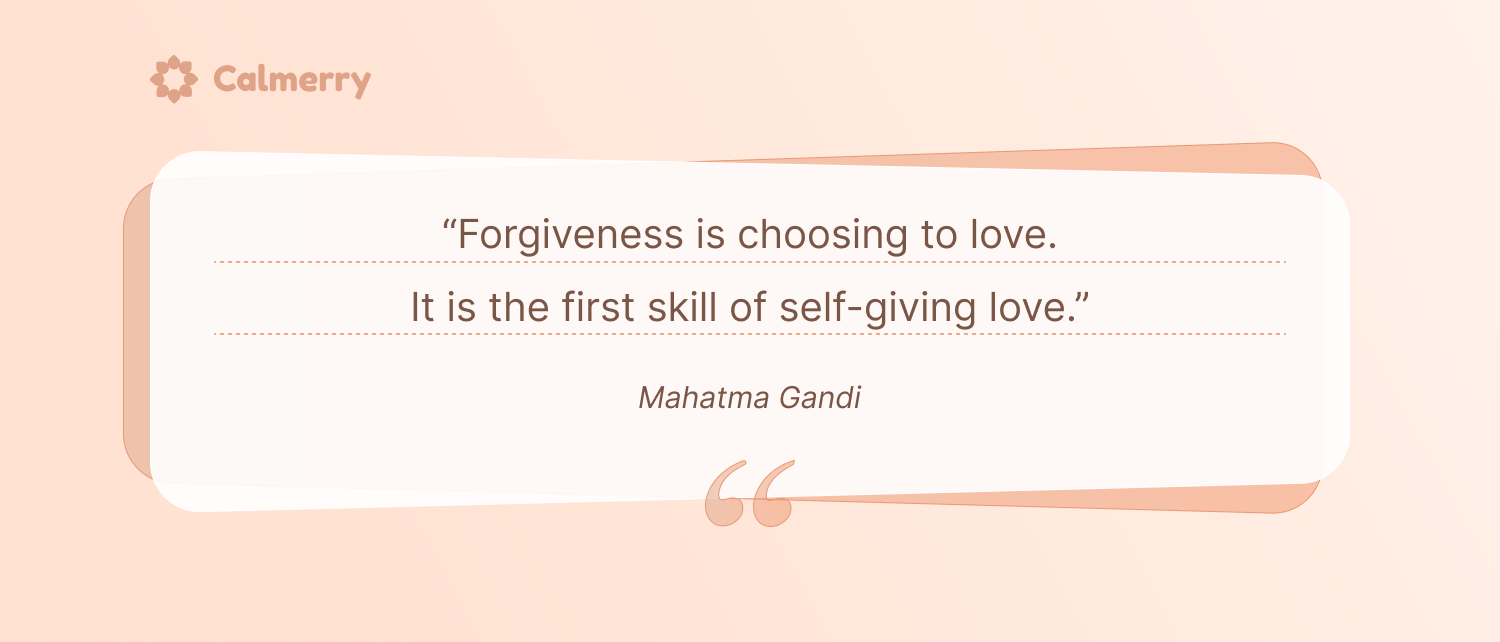
Ultimately, self-forgiveness is an essential part of self-care. Diamond Thaxton puts it this way:
“Numerous studies have proven that negative self-talk and severe punishment garnish the positive results we’d like to see in the future. [3] Kim, J., Kwon, J. H., Kim, J., Kim, E. J., Kim, H. E., Kyeong, S., & Kim, J. (2021). The effects of positive or negative self-talk on the alteration of brain functional connectivity by performing cognitive tasks. Scientific Reports, 11(1). https://doi.org/10.1038/s41598-021-94328-9 Instead, this way of thinking can lead to depression, the inability to make effective decisions, and the constant fear of failure inhibiting growth.”
Also, forgiveness can increase feelings of self-worth and peace of mind. It can help you cope with intense emotions healthily and focus on more positive aspects of your life.
Additionally, self-forgiveness can help improve your relationships with others, allowing you to develop empathy and understanding. [4] Pelucchi, S., Paleari, F. G., Regalia, C., & Fincham, F. D. (2013). Self-forgiveness in romantic relationships: it matters to both of us. Journal of family psychology : JFP : journal of the Division of Family Psychology of the American Psychological Association (Division 43), 27(4), 541–549. https://doi.org/10.1037/a0032897
So, when you choose to forgive yourself, you’re taking an important step toward improving your mental health.
Here’s how to forgive yourself – or at least try
Forgiving yourself is no easy task. But it’s absolutely essential for living a happy and healthy life.
The goal here is not condoning your actions that might have hurt you or others. Instead, self-forgiveness is about choosing to free yourself from the prison of guilt and shame.
Forgiving yourself is a way of moving on from the past and embracing the present. It’s about accepting what is and letting go of what could have been.
By taking the first step, you’ll be closer to finding closure and moving on with your life. These 10 strategies may give you an easy start on this way.
1. Try the 4 Rs of self-forgiveness
Self-forgiveness doesn’t mean excusing your harmful behavior or pretending it never happened. Conversely, it’s about recognizing that you made a mistake, learning from it, and then letting go of the self-judgment and self-criticism.
It’s also about giving yourself the compassion you deserve and understanding that you can change and grow.
These ideas are put in one of the therapeutic models for self-forgiveness in the 4 key actions [5] Cornish, M. A., & Wade, N. G. (2015). A Therapeutic Model of Self-Forgiveness With Intervention Strategies for Counselors. Journal of Counseling and Development, 93(1), 96–104. https://doi.org/10.1002/j.1556-6676.2015.00185.x :
- Responsibility
- Remorse
- Restoration
- Renewal
By following these four steps, you can begin the process of self-forgiveness and start on the path to healing.
An important note: this model can’t be applied to people who blame themselves for something they aren’t responsible for or the things they couldn’t have prevented, like health issues, loss and grief, abuse and other traumatic experiences, or negative body image.
1. Responsibility
According to this model, first, you take responsibility for your actions. This means acknowledging that you messed up, what you did wrong, and accepting that you’re the one (or one of the people involved) who should make things right.
That’s the hardest step that leaves no room for excuses or justification for your actions.
2. Remorse
Next, you express remorse for your actions. This step includes recognizing the hurt that you may have caused.
This is the stage where you face difficult emotions and feelings of worthlessness, shame, guilt, aggression, disappointment, and remorse.
And that’s absolutely okay and healthy. The feelings you’re experiencing now have their purpose and may very well be a springboard for a positive change in the future.
But too often, these intense emotions wrap around us like a cloak, growing heavier with each self-inflicted wound. We try to hide from them or cover them up. But they are always there – a constant reminder of our perceived failures. Besides, they can also make you think you’re a bad person.
Recognizing and accepting your emotions is an important step in the forgiveness process. They don’t have to control or define you.
Emotions are simply information. Building confidence in your ability to tolerate them helps with reducing our minds’ protective desire to protect you from making mistakes again by ruminating on them.
– Tiffany Lovins, Licensed Mental Health Counselor (LMHC)
Once you’ve acknowledged your emotions, you can start to work through them.
So, give yourself time to grieve and process them to move on.
3. Restoration
Third, you take steps to restore the relationship. If you’ve done something you regret and want to fix, take steps to restore it and nurture the trust in a relationship – with others and yourself.
This could involve sincere apologizing, making amends, or taking measures to prevent the situation from happening again.
When you’re in a situation where you can’t actively make amends to the individual involved, this may look like investing your energy in other positive ways that contribute to society or other relationships.
4. Renewal
Finally, you renew your commitment to yourself and the relationship. This step includes self-compassion, learning, and growing from your experiences to do better in the future.
Living your life in a way that is congruent with your values promotes a healthy relationship with yourself and others.
– Tiffany Lovins, Licensed Mental Health Counselor (LMHC)
2. Let go of past mistakes
To err is human, to forgive divine.
We all make mistakes. It’s a part of being human. Sometimes, we repeatedly revisit those minor typos in our posts. And sometimes, we make significant mistakes that have far-reaching consequences.
But regardless of their size or impact, they can all weigh heavily on our minds.
They can haunt us for years, causing us to beat ourselves up long after the fact. We can be our worst critics who tell ourselves we’re failures or not good enough. We tend to dwell on our faults and berate ourselves for not being perfect.
This can lead to feelings of low self-worth and self-loathing. And this can prevent us from moving on and making better choices in the future.
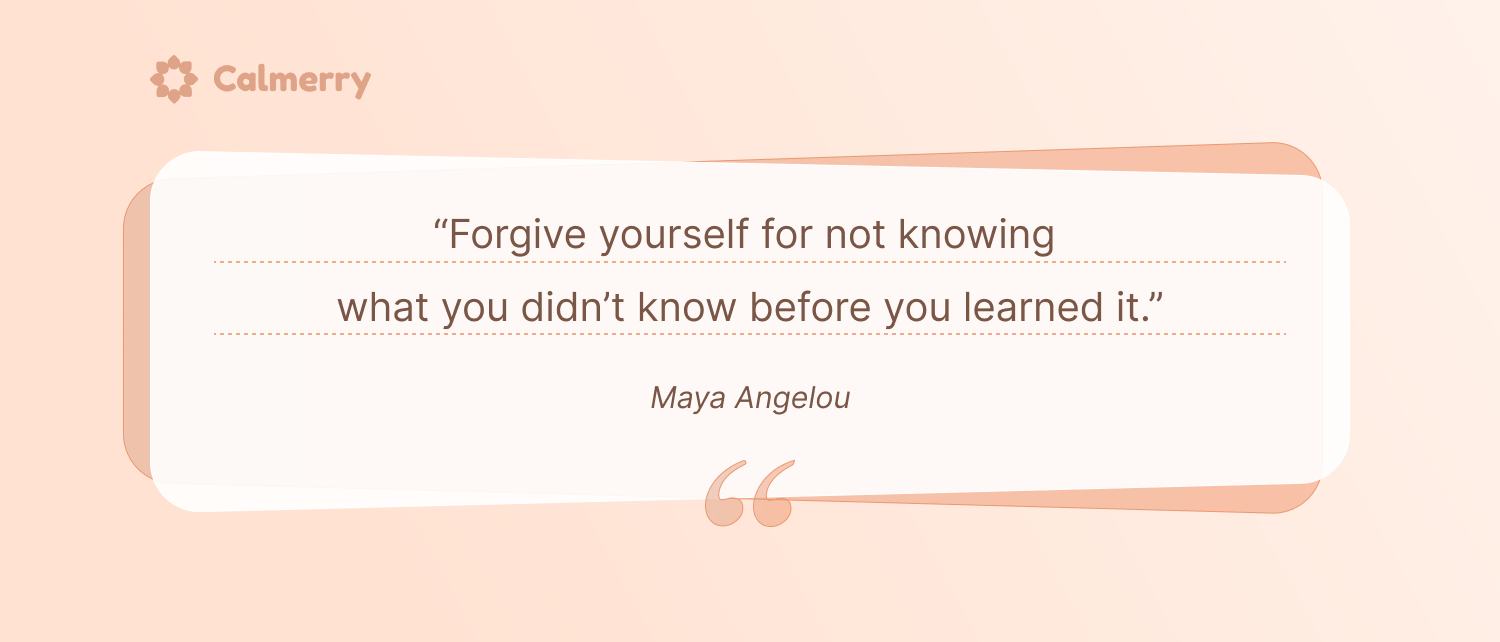
If you’re struggling to let go of past mistakes, remember that they’re a part of life, but they don’t define you as a person. It’s helpful to learn to separate yourself from the mistakes you might have made.
No one is perfect, but we can all strive to be better versions of ourselves. And every mistake is an opportunity for growth. So don’t be afraid to make them, learn from them, and let them go.
3. Practice empathy
To put it simply, empathy is the ability to understand and share the feelings and emotions of another person and even sense what they might be thinking. Diamond Thaxton, LMHC, CASAC, Psy.D., shares why and how to use the power of empathy:
“One of the most significant ways to make it easier to forgive yourself is to practice empathy daily. To be empathetic to others, even with small failures such as being late to a meeting or calling someone the wrong name. By allowing others grace, we can learn to practice that we also deserve dignity.”
Indeed, when you can step outside of yourself and see your mistake from someone else’s perspective, forgiving yourself can be much easier.
The counselor explains further, “When we join the cycle of putting others down, we bring that same energy to ourselves. One technique used when practicing grace is to talk to yourself like you would someone you love. This is a great technique to practice forgiving yourself but having empathy for strangers.”
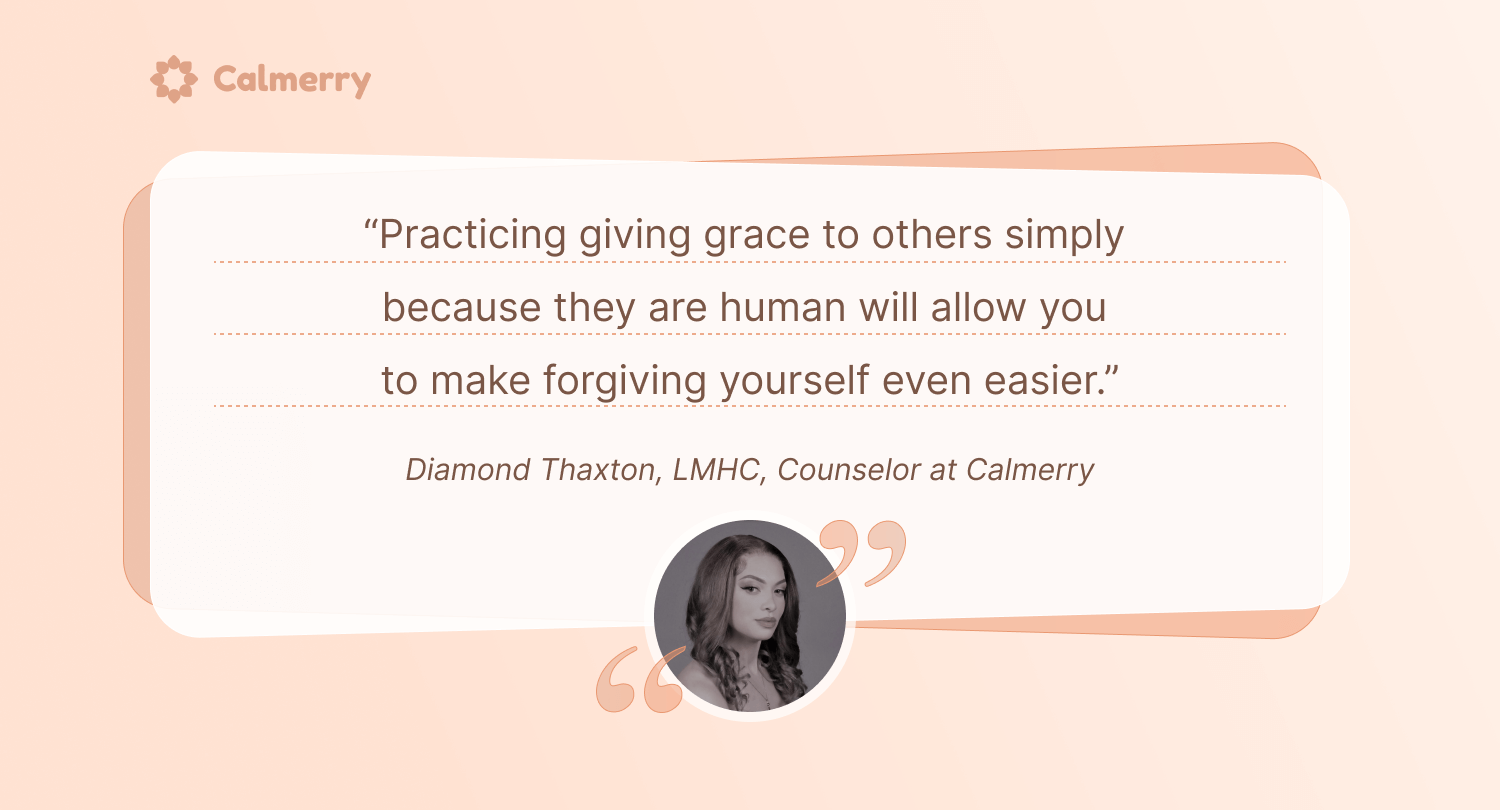
4. Consider the opposite point of view
Guilt can be a heavy burden to carry, but it doesn’t have to control your life. So, try to see the situation from a different perspective to be easier on yourself.
Everyone reacts to situations differently. And the chances are, the person you hurt may have already forgiven you, even if you haven’t forgiven yourself.
Talk to them and see how they feel about what happened. They may give you some perspective that helps you to forgive yourself.
If you can’t talk to them, consider looking at the situation as a pie graph of responsibility:
- What percentage of the pie belongs to your actions?
- What percentage can be attributed to other people?
- What percentage may belong to the environment or other factors that contributed to the situation?
This may help balance the emotional burden and bring some objectivity to the situation.
5. Remember that you’re never to blame for your health issues and trauma
It’s common to feel guilty when you’re struggling with health problems. In fact, guilt is a common symptom of:
- Depression
- OCD
- Borderline personality disorder
- Chronic physical illnesses
- Bipolar disorder
- PTSD
You may believe that you somehow brought the illness on yourself or could have done more to prevent it. Or, you think that your health affects your loved ones. After all, we’re often told that we should be able to just “snap out of it” or control our thoughts and emotions.
But it’s important to remember – you’re not to blame for your health issues and emotional problems. No one deserves to be sick, no one deserves to be abused, and no one can control everything that happens to them.
So, treat yourself with kindness and compassion instead of beating yourself up. Start adopting self-care habits and focus on getting better.
And know that you’re not alone in this journey.
6. Write yourself an apology
If you’re struggling to forgive yourself, one helpful exercise is to write yourself a self-compassion letter. It’s one of the forms of emotional expression writing.
The goal is to express your regret and remorse in a kind and understanding way, taming a self-critical voice. This can be a healing exercise that helps you to let go of your guilt and move on with your life.
Sit down with a pen and paper, and write out a sincere apology for whatever you’re struggling to forgive yourself for. Try to be as specific and compassionate as possible. Then, read your letter aloud, and try to imagine yourself hearing those words from your friend.
The goal is not to sweep your feelings under the rug – rather, it’s to start making peace with what happened and begin moving on.
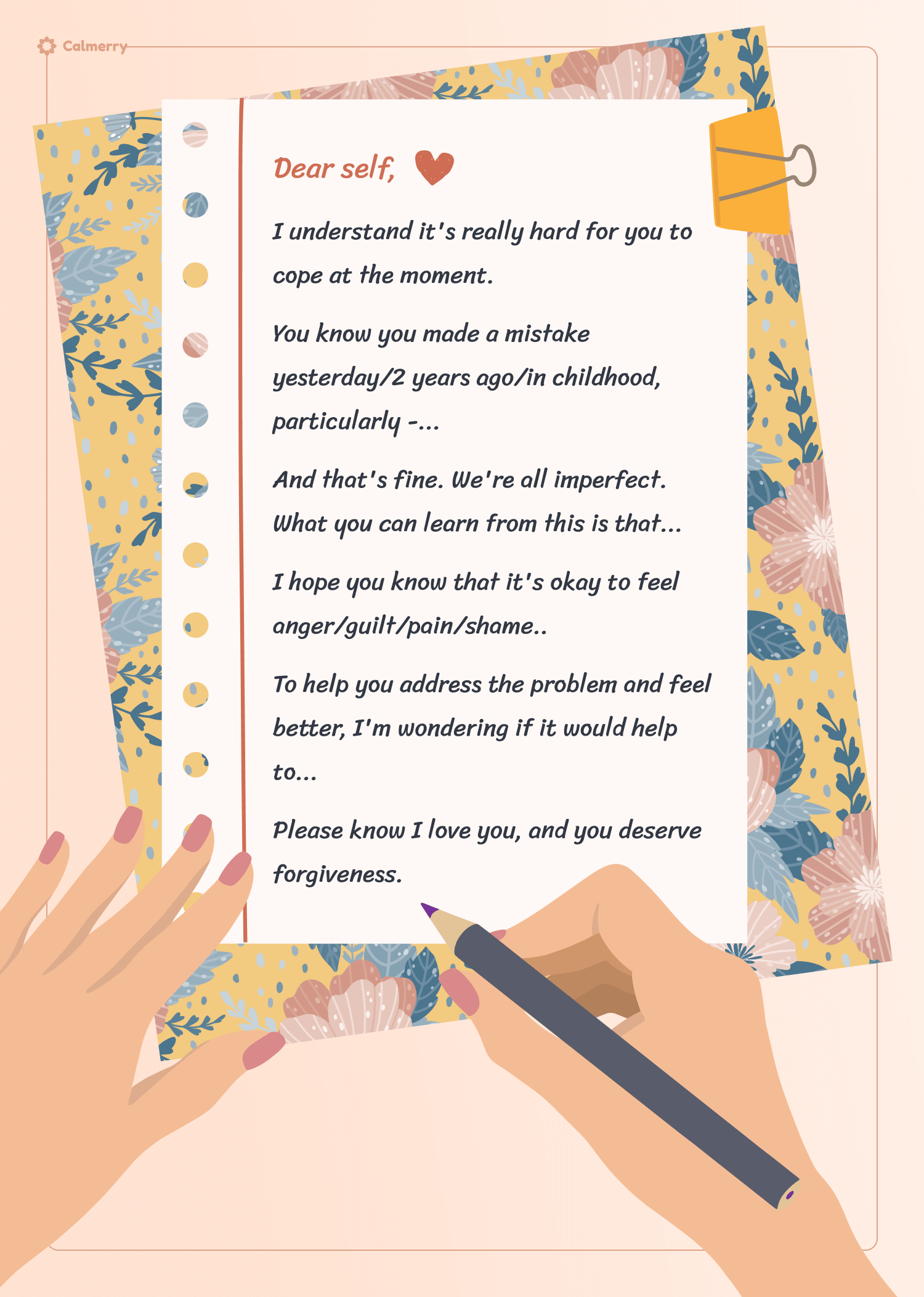
7. Try these 14 self-forgiveness affirmations
Practicing positive affirmations for forgiveness can help you let go of self-judgment and move forward with confidence and compassion. Give yourself those words of encouragement when you feel low.
If you’re looking for some powerful self-forgiveness affirmations, start with our favorite ones:
- I forgive myself for all of my past mistakes
- I’m worthy of forgiveness
- I’m capable of change
- I won’t feel guilty for treating myself with love and care anymore
- I deserve love, happiness, and respect
- I’m doing the best I can with what I have
- I deserve compassion and understanding
- I was too hard on myself and neglected my needs. Now, it’ll change
- I’m learning from my mistakes and growing as a result
- I’m allowed to feel anger, sadness, and other emotions without judgment
- I accept myself unconditionally
- Every day is a new opportunity to start fresh
- There’s nothing wrong with me – I’m wonderful, just as I am
- Forgiving myself is essential for my mental well-being
8. Treat yourself with more compassion – you deserve it!
Guilt and shame are two particularly powerful emotions that can cause us to retreat into ourselves, wallowing in self-pity or self-loathing.
The secret of true healing from these wounds is touching them with compassion.
It’s not always easy to love ourselves, especially when we badly regret some of our actions. But remember that you’re worthy of love and forgiveness – both from others and yourself.
Compassion allows us to see our sorrows and mistakes for what they are – a part of life that we all experience. It gives us the strength to face our fears and pain and allows us to move forward with empathy and understanding.
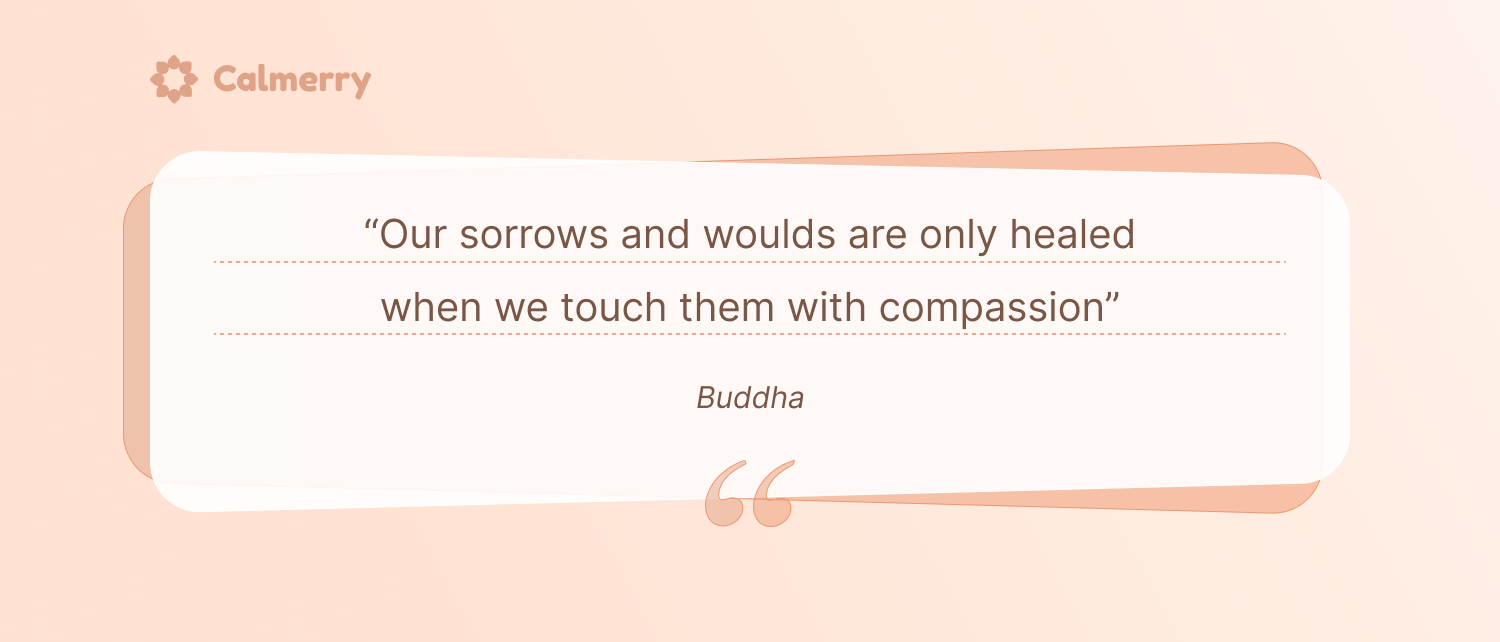
Compassion will soften the hardest of hearts, kindness will open up the door to self-acceptance, and self-love will finally allow us to see ourselves as worthy of forgiveness and happiness.
It’s a process that requires time and patience, but it’s worth it to be free from the chains of self-hatred.
9. Share with someone who you can trust with your vulnerabilities
Another way to heal these wounds is by reaching out to others who have gone through similar experiences. Or to those you trust and who can provide you full acceptance.
By sharing our stories and connecting with others, we realize we are not alone in our journey. We can learn from each other and get the support we need.
Sharing our stories also allows for exposure to painful experiences and emotions. This allows us to show ourselves we can tolerate the feelings without allowing them to feel all-consuming. This, in turn, will decrease the intensity of the emotion and increase acceptance and resolution.
– Tiffany Lovins, Licensed Mental Health Counselor (LMHC)
10. Talk to a mental health professional
But we all know that forgiveness is never easy – for someone else or yourself. If you’re struggling to forgive yourself, talking to a licensed therapist in a safe and non-judgmental space can be very beneficial. Therapy can provide the guidance and support needed to work through these challenging emotions and foster self-compassion, ultimately aiding in the journey toward self-forgiveness.
Online therapy on Calmerry can be a helpful step on the road to healing.
With the help of a therapist, you can:
- Explore the underlying reasons for your actions and choices – why you did what you did – with an unbiased perspective
- Get tools, techniques, and insights to help you understand and address the underlying issues contributing to your struggle
- Process and understand the emotions associated with self-forgiveness. A therapist can assist you in identifying and working through any underlying issues, such as guilt, shame, or regret
- Start healing unresolved trauma
- Understand the root causes of your self-criticism and develop more compassionate self-talk
- Develop positive body image and increase self-awareness
- Work on developing a self-care routine
- Get a consistent source of support during your journey towards self-forgiveness. Your therapeutic relationship can provide validation, encouragement, and a sense of companionship
Before you go, here’s your takeaway message: self-forgiveness is a sign of strength, not weakness. It shows that you’re willing to move on from the past and create a better future for yourself.
Davis, D. E., Ho, M. Y., Griffin, B. J., Bell, C., Hook, J. N., Van Tongeren, D. R., DeBlaere, C., Worthington, E. L., & Westbrook, C. J. (2015). Forgiving the self and physical and mental health correlates: A meta-analytic review. Journal of Counseling Psychology, 62(2), 329–335. https://doi.org/10.1037/cou0000063
Weir, K. (n.d.). Forgiveness can improve mental and physical health. https://www.apa.org/monitor/2017/01/ce-corner
Kim, J., Kwon, J. H., Kim, J., Kim, E. J., Kim, H. E., Kyeong, S., & Kim, J. (2021). The effects of positive or negative self-talk on the alteration of brain functional connectivity by performing cognitive tasks. Scientific Reports, 11(1). https://doi.org/10.1038/s41598-021-94328-9
Pelucchi, S., Paleari, F. G., Regalia, C., & Fincham, F. D. (2013). Self-forgiveness in romantic relationships: it matters to both of us. Journal of family psychology : JFP : journal of the Division of Family Psychology of the American Psychological Association (Division 43), 27(4), 541–549. https://doi.org/10.1037/a0032897
Cornish, M. A., & Wade, N. G. (2015). A Therapeutic Model of Self-Forgiveness With Intervention Strategies for Counselors. Journal of Counseling and Development, 93(1), 96–104. https://doi.org/10.1002/j.1556-6676.2015.00185.x
online therapy
live video session



